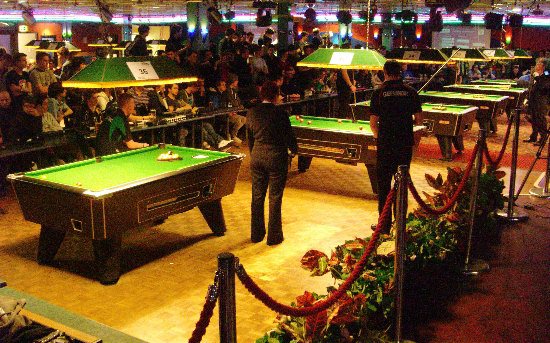| Tags | show all posts |
Pool Table Game Speed - Fast and Furious
Pool Table Pace of Play
Pool Table Games Speed—There was great excitement when the UK version of pool was introduced in the early 1970s.
The game, predominantly housed in pubs and clubs, was not just fast and exciting, but also a significant source of income. The high revenue allowed operators to reinvest in promotion, offer prizes to house champions, and invest in leagues.
The game's popularity caused a group of operators to form a National Association of Operators (BAPTO) to organize a national championship, which was a great success and is still nearly 40 years later.

pool tables
It was decided that although UK pool was extremely popular, it was taking too long to play. This was causing backlogs on the pool table and, of course, a loss of revenue. A few rules were changed, which had a great impact on the speed of play.
Rule change for a foul. This rule was changed to a two-shot penalty, so if you missed your second shot, your visit to the table was over. This speeded up the game significantly.
The rule that did not exist that slowed the game down was the way of breaking off. Players would gently roll the cue ball into the pack of object balls, just disturbing a few balls, and then continue to tip-tap their way around the table, blocking pockets until their opponent had few options left with most pockets blocked.
This was good tactical play, but it meant better players could dominate games, and it could take half an hour for a game to finish. Not only was this boring to watch, but it was commercial suicide, as it greatly affected the earning potential in pubs, where people were used to five games in an hour and not two. Something had to be done, and different operators and leagues made changes.
The most significant change was introducing a rule that said that at least two balls had to hit the cushions off the break, which meant a forceful shot had to be made with the cue ball. This worked wonders, and an open break gave both players the opportunity to score.
In televised competitions and some leagues, they have also introduced a shot clock, under which your shot must be played within 30 seconds, or you will be penalised.
Another rule that was changed was the shot to pot the black 8 ball to win the game. Again, in the early days, this had to be pocketed in the same pocket that the last of your set of balls went in. This was quickly changed to black ball any pocket.
The tactical play still exists and is an excellent part of the game, but thankfully, better players have realised that fast potting is the only way to keep this great game alive and interesting.
The problem with slow play has never been an issue with the original American Pool Tables, as the bigger pockets don't allow for the sort of slow tactical game we have with the smaller ball tables. American pockets allow 2 x 2-1/4 inch balls to pass into the pocket, whereas the smaller UK pocket only takes a ball and a half of the 2-inch ball.
The game of pool has evolved over the years for the better. Although there are several sets of rules in force, most have adopted the faster play maxim. Pool rules are available from our website store if required.
Let's keep this great game moving forward.

Speed of pool in tournaments needed to be quicker.

